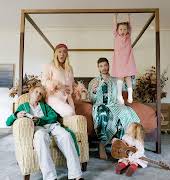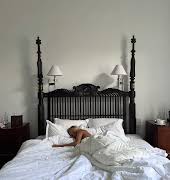By Lauren Heskin
13th Mar 2020
13th Mar 2020
Today is World Sleep Day (March 13) and sleep is something we prize. But did you know that smell and sleep are actually very closely linked? Comforting odours will not only help you fall asleep, but sleep longer and dream pleasantly.
It’s a universal truth that the older we get, the more we appreciate sleep. As small children, it feels like everything good and exciting happens after our bedtime, and despite an enviable ability to pass out in a busy public place, slung awkwardly across the person or propped up at the dining table, they fight it with their very fibre.
As adults, every precious droplet of snooze time is prized. New parents brag about their first “full night’s sleep” and the weekend sleep-in is probably the greatest prize of our working week. Typically too, sleep has become more difficult to come by, as our schedule means we wake up at 7am, with or without alarms, and technology soak up precious nighttime minutes as entertainment and sleep-postponing screens make it harder to nod off.
There are plenty of things we can do to improve our sleep. Establishing a good nighttime pattern and a consistent bedtime, committing to putting your screen away before bed or charging it in a different room, being careful of food and drink intake in the hours leading up to sleep, especially of stimulants such as caffeine.
The Importance of Scent
However, one thing we should definitely be considering when it comes to improving our sleeping pattern is scent. Smell is one of our most important senses and scientists think it holds a very strong link to memory, much stronger than that of visual and sound cues. I recently passed a woman in the street and her perfume hit me with a memory of my junior infants teacher admiring my colouring as I sat in a wooden chair with crayons strewn across the table. This visceral connection to memory is important for sleep and dreams, as your brain uses sleep to retain and consolidate memories for future recall.
The Science Behind Sleep and Scent
The thalamus, a tiny peanut-sized structure in the centre of the brain controls both our sleeping patterns and scent understanding, while either side of it lies the limbic system, our memory centre. These close connections have led scientists to study the impact of scent on our sleep and the results are quite surprising.
Not only does scent hugely impact our sleep but this impact is very different to the sleep’s relationship with other senses like sound and vision. While a strong sound or light will disturb our sleep or even wake us, a strong smell can stimulate the brain, without waking us.
In fact, a study showed that pleasant odours before and during sleep can encourage deeper sleep and better dreams, resulting in more energy when you wake up. Bad odours, on the other hand, were proven to cause a broken and nightmare-strewn sleep.
A study on PTSD patients found that “nocturnal olfactory stimulation has the potential to manipulate the emotional tone of dreams without waking the sleeper”. So on top of being comforting and pleasant, nice smells will encourage you to nod off, sleep deeply and dream pleasantly.
What Scents to Choose?
While favourite scents vary from person to person (that’s why there is such an array of perfumes), there are a few particular aromas that are linked with sleep. The White Company have worked with expert British perfumers to select six soothing essential oils for their SLEEP kit to encourage a calming night-time routine. They include lavender, chamomile, clary sage, aloe vera, shea butter and jojoba oil. These scents have been recognised for their efficacy in improving sleep quality through aromatherapy.

The White Company’s SLEEP kit, including a candle, diffuser, pillow spray, bath soak and body cream.
Lavender, in particular, has been proven to slow your heartbeat, reduce blood pressure and skin temperature, all things conducive to falling asleep.
How to Incorporate Scent into Your Sleep Routine
“It is important you create a restful retreat to shake the day off,” says Chrissie Rucker, founder of The White Company, “and adding fragrance to your bedtime ritual can help the brain associate certain scents with slowing down and preparing for sleep.”
Start by establishing a consistent wind-down routine. Do you like a bath before bed, enjoy curling up on the sofa, or perhaps switching off with a book? Consider lighting an aromatherapy candle or adding a few drops of bath soak or essential oils to your bathwater. Spritz a pillow spray onto towels, pyjama collars or bathrobes too to keep you immersed as you move through your routine.
As you’re lulling yourself off to sleep, encourage a good night’s sleep with a pillow spray and a diffuser by your bed is a safe way to encourage pleasant dreams throughout the night.
Sleep well…
Featured image via The White Company
Read more: 7 beautiful bedrooms from our Pinterest to inspire your decorating dreams
Read more: Trouble nodding off? This viral sleeping hack says it can happen in 120 seconds
Read more: WhatsApp dark mode is almost here – and it should help you sleep easier






















